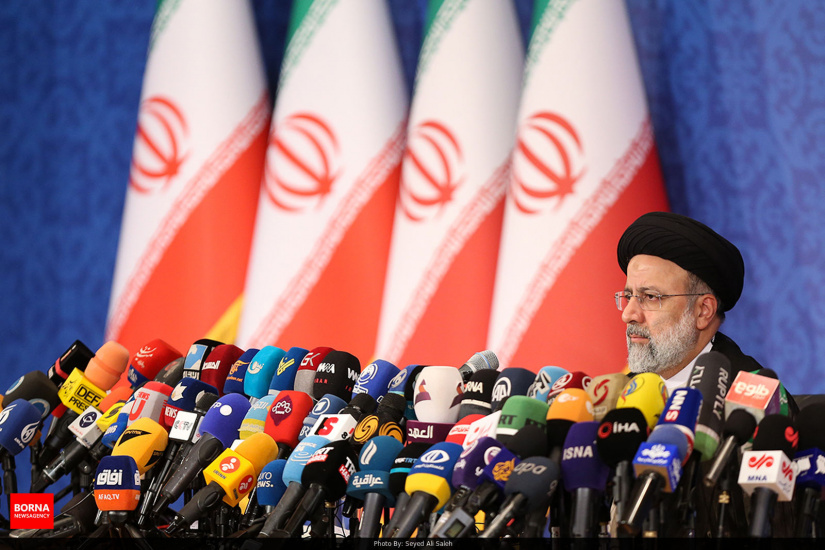Raeisi and the Future of US-Iran Relations

Ebrahim Raeisi, branded in the Western media as an "ultraconservative," will assume the 8th presidency of the Islamic Republic of Iran in August under very challenging circumstances marked with the double whammy of health and economic crises. Intent on not repeating his predecessor's mistake of putting nearly all the bets on the nuclear deal and the resolution of foreign-imposed sanctions, Raeisi in his first post-election press conference sought to decouple his agenda from the nuclear deal, known as the JCPOA (Joint Comprehensive Plan of Action), while at the same time calling on the US to return to the agreement and to end the sanctions. He also stated that he refuses to meet the US President Joe Biden, ruled out any negotiations on Iran's missile program, and vowed to uphold the "revolutionary values."
In turn, the Biden administration has had studied, and nuanced, reactions to Raeisi's victory, on the one hand clamping down on various Iranian news outlets in a sign of toughening stance and, on the other, sending signals that no final decision on the agreement will be made before August, irrespective of the media reports that nearly all the disagreements have been resolved and the documents are prepared to sign, requiring "political will." In Tehran, as is well-known, a special JCPOA committee within the Supreme National Security Council has been set up to oversee the process and, therefore, any pre-Raeisi agreement within the next few weeks will inevitably have the seal of authority transcending the Rouhani administration. In other words, it makes little difference if a new agreement is reached before or after Raeisi's formal assumption of power, in light of his explicit endorsement of the Vienna process.
But, while Raeisi's (moderate) position with respect to the JCPOA is clear, there is a great deal of unknown about his other foreign policy preferences, awaiting his selection of the foreign policy team. His lack of background in foreign policy matters represents a potential weakness that, hypothetically speaking, might lead to contradictory directions and even incoherence, which is why it is imperative that Raeisi chooses a seasoned foreign minister who prioritizes diplomacy and avoids rigid ideological slogans. An important indicator of Raeisi's handling of the foreign policy matters will be the fate of the pending bills on money-laundering, which require passage in the hard-line dominated Parliament, otherwise Iran will remain in the financial black list of Financial Action Task Force (FATF), even after the JCPOA's revival; in that case, Iran's benefit from the latter will be limited and Iran's banking sector will continue to be sunned by the global financial networks. Yet, neither the JCPOA nor the FATF-related bills are popular with the lawmakers, who maybe on collision course with the Raeisi administration from the outset, despite the hoopla regarding the post-Rouhani political uniformity of the various branches of the government. This is due, first and foremost, to the fact that, ideological perceptions aside, the Raeisi presidency must steer a moderate course in the international arena in order to achieve its objectives, i.e., of normalizing Iran's foreign trade, otherwise Iranian economy will continue to suffer. To this effect, Raeisi has sent the signal that he seeks balanced and constructive relations "with all countries," in essence meaning that he is not in favor of a purely "look east" orientation, favored by some Iranian hard-liners. Yet, a great deal of political compromise, such as with respect to FATF issues, is required before the West can accommodate itself to Raeisi's presidency, particularly since at the moment he remains on the sanctions list, barring his ability to attend the UN gatherings. An important gesture by the Biden administration would be to remove Raeisi from the list, which will likely happen in tandem with any final agreement on the Vienna talks.
Henceforth, we are apt to witness a Janus-faced Raeisi presidency, conveying contradictory impulses, which would require to evolve more and more in a moderate direction in line with Iran's national interests. Iran's regional interests dictate normalization of relations with Saudi Arabia and regional cooperation against terrorism and extremism as well. Prioritizing Iran's domestic needs, Raeisi who has pledged to combat poverty, unemployment, inflation, and corruption, must realize that a certain give and take on regional issues is necessary and Iran can prosper by playing an even greater stability role commensurate with the country's pivotal position. Ultimately, the "ultraconservative" early branding of Raeisi must prove to be a tissue of misperception through an energetic application of moderate domestic and foreign recipes for action that over time would build trust abroad and add to political legitimacy at home. A breakthrough in the stalemated US-Iran relations is henceforth potentially feasible in the proximate future, depending in part on Mr. Raeisi's crucial choices aforementioned.

